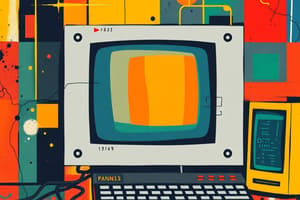Podcast
Questions and Answers
What was one of the key impacts of computers on society?
What was one of the key impacts of computers on society?
- Transforming the way people communicate and think (correct)
- Promoting traditional methods of communication
- Enhancing physical fitness and well-being
- Revolutionizing transportation systems
When did the personal computer revolution take off?
When did the personal computer revolution take off?
- In the 1970s (correct)
- In the 1960s
- In the 1980s
- In the 1990s
What was a defining feature of early electronic digital computers?
What was a defining feature of early electronic digital computers?
- They were small and portable
- They were only used for entertainment purposes
- They were powered by solar energy
- They required teams of operators to perform basic tasks (correct)
What major development in internet history enabled global communication and information exchange?
What major development in internet history enabled global communication and information exchange?
What marked the introduction of more accessible and affordable computers in the 1980s?
What marked the introduction of more accessible and affordable computers in the 1980s?
Which individual is considered the father of computer science?
Which individual is considered the father of computer science?
In which industry did computers revolutionize the way businesses operate?
In which industry did computers revolutionize the way businesses operate?
Who is responsible for the creation of the World Wide Web?
Who is responsible for the creation of the World Wide Web?
What has computers enabled in the field of education?
What has computers enabled in the field of education?
Which individual played a crucial role in the development and popularization of personal computing?
Which individual played a crucial role in the development and popularization of personal computing?
Study Notes
The History of Computers: A Game-Changer in Society
The history of computers is a fascinating journey, tracing the development of technology that has had a profound impact on our lives. From the early mechanical devices to the modern-day supercomputers, computers have transformed the way we work, communicate, and think. This article explores the history of computers and their impact on society, as well as key figures who have shaped the field.
The Early Days of Computing
Computing began in the 17th century with the invention of the mechanical calculator, which could perform basic arithmetic operations. The first electronic digital computers were developed during and after World War II. These early computers were massive, occupying entire rooms and requiring teams of operators to perform basic tasks.
The Birth of Personal Computing
The personal computer revolution took off in the 1970s, with the introduction of the Altair 8800, which was considered one of the first commercially available microcomputers. In the 1980s, computers became more accessible and affordable, with the introduction of the IBM PC and the Apple Macintosh.
The Rise of the Internet
The advent of the internet in the 1990s further transformed the computer landscape, enabling global communication and the exchange of information. Key milestones in internet history include the creation of the World Wide Web by Tim Berners-Lee and the development of search engines like Google.
Impact of Computers on Society
Computers have had a significant impact on society, reshaping industries, communication, and our daily lives. Some of the key areas where computers have made a difference include:
-
Business: Computers have revolutionized the way businesses operate, enabling automation, data analysis, and efficient communication.
-
Communication: The internet and computers have enabled instant global communication, connecting people and businesses across the world.
-
Education: Computers have opened up new possibilities for education, with online courses, virtual classrooms, and digital resources transforming the learning experience.
-
Entertainment: Computers have also had a significant impact on the entertainment industry, with the development of video games, streaming services, and digital media.
Key Figures in Computer History
Several individuals have made significant contributions to the development of computers and the field of computer science. Some of the most influential figures include:
-
Alan Turing: Considered the father of computer science, Turing developed the concept of the universal machine, which laid the foundation for modern computing.
-
Tim Berners-Lee: The creator of the World Wide Web, Berners-Lee is responsible for the modern-day internet and the way we access information online.
-
Steve Jobs: As co-founder of Apple, Jobs played a crucial role in the development and popularization of personal computing.
-
Bill Gates: Co-founder of Microsoft, Gates was instrumental in the development of the PC and the software industry.
In conclusion, the history of computers is a testament to human ingenuity and the power of technology to transform our lives. From the early mechanical calculators to the modern-day supercomputers, computers have had a profound impact on society, shaping industries, communication, and our daily lives. As we look to the future, the possibilities for computer technology are endless, and the impact on society will continue to grow.
Studying That Suits You
Use AI to generate personalized quizzes and flashcards to suit your learning preferences.
Description
Test your knowledge about the impact of computers on society, from the early mechanical calculators to the modern-day supercomputers. Explore the birth of personal computing, the rise of the internet, and key figures who have shaped the field of computer science.




